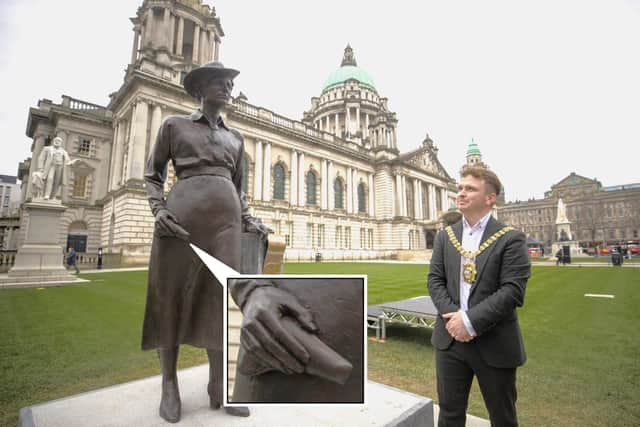Gun-toting Winifred Carney statue at Belfast City Hall: 'Today it is a 1916 rebel being honoured... will it be a Provo tomorrow?'
and live on Freeview channel 276
Kenny Donaldson was reacting to the unveiling last week of a life-sized sculpture of Winifred Carney in the grounds of Belfast City Hall by the council.
Although it has been left vaguely-shaped, it appears she is carrying a holstered gun in her right hand.
Advertisement
Hide AdAdvertisement
Hide AdCarney, a trade unionist, famously accompanied the rebels into the GPO in Dublin during the rebellion, armed with a Webley revolver.


Roughly 500 people – mostly civilians – were killed in the Rising, which never had any real prospect of military success.
Unveiled alongside the Carney statue was one to anti-slavery campaigner Mary Ann McCracken.
Mr Donaldson, director of the South East Fermanagh Foundation (which lobbies for survivors and those bereaved by Troubles attacks), said: "How many other women could have been depicted who have given lives of service to the community and of campaigning for social change using fully peaceful and democratic methods?
"But they weren't ever going to be the priority.
Advertisement
Hide AdAdvertisement
Hide Ad"There is concern amongst some that today it's Winifred Carney, but further pushes in the future are likely to come for other figures to be included from the border terrorist campaign [of the 1950s] – and indeed the period referred to as ‘The Troubles’.”
He said it is just part of a much wider “slow-burning” movement to “recondition” people into believing terrorism was a legitimate response to past grievances.
Finding out who actually approved the statue has proven extremely difficult.
That’s because it has been passed back-and-forth countless times between various council groups for several years, and the minutes of meetings often record only the overall outcome of a vote, not how each party or each councillor voted.
Advertisement
Hide AdAdvertisement
Hide AdThe first reference the News Letter can find to Winifred Carney is in 2017, in the minutes of a meeting of the council's Historic Working Group.
They show that then-councillor Deirdre Hargey (later the Sinn Fein communities minister) raised the issue of a statute honouring her – but said the idea had originated with the NI branch of the Irish Congress of Trade Unions.
In 2019 the proposal was voted down at a meeting of the Strategic Policy and Resources Committee (by 12 votes to seven, though it is not recorded who voted how).
In 2020, that committee agreed to install two new statutes, but there was no mention of whom it would be.
Advertisement
Hide AdAdvertisement
Hide AdBased on the available documents though, it is clear that by spring 2021 the idea of a Carney statue was back on the table.
It appears that the plan for both statutes got approval from the Strategic Policy and Resources Committee on May 21, 2021, and that this was ratified in the next full council meeting (though its not clear if it was put to a vote or just waved through).
Deputy chair of the committee at the time is the current DUP group leader, Sarah Bunting.
She could not be reached today.
MLA Brian Kingston, then a DUP councillor on the same committee, could be reached.
Advertisement
Hide AdAdvertisement
Hide AdHe was asked about how he voted on it, but he insisted the News Letter must address all enquiries about council business to the current group leader, Ms Bunting.
We rung several other unionists who sat on the committee at the time in 2021, but only one – ex-councillor Tom Haire – responded, and said he could not remember the details.
“I couldn’t honestly tell you now, because it’s a couple of years ago and there’s that many things moved, but I wouldn’t have expected my party – the DUP – to have voted in favour of it,” he said.